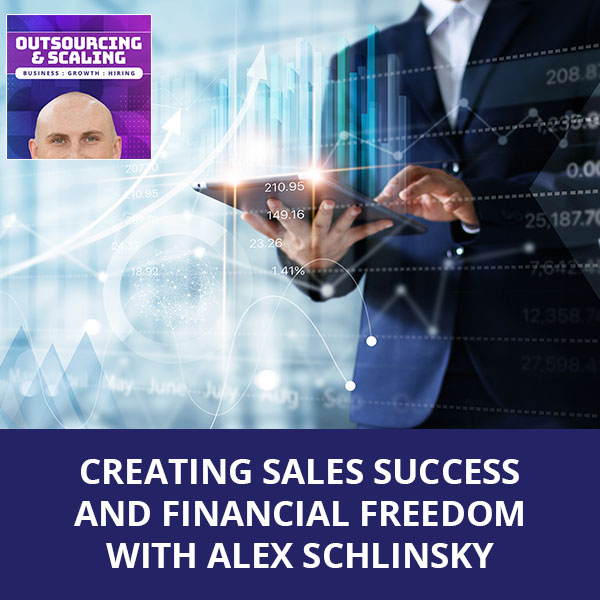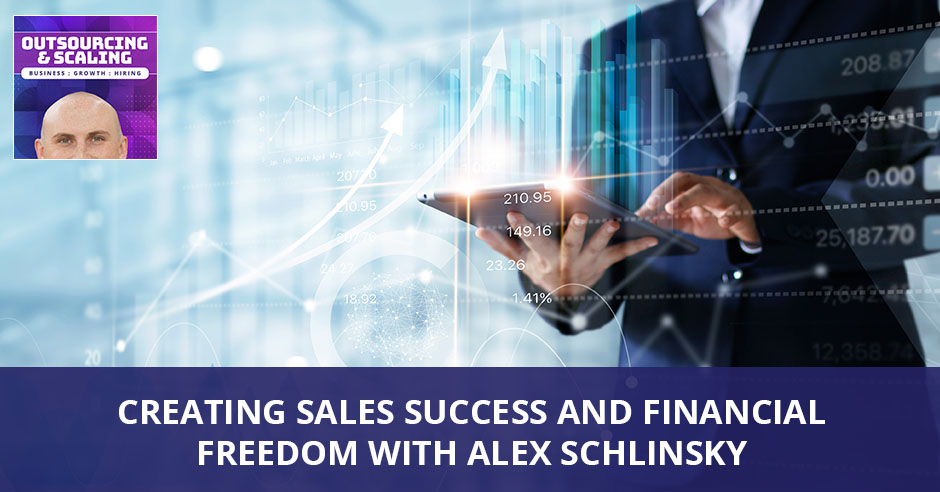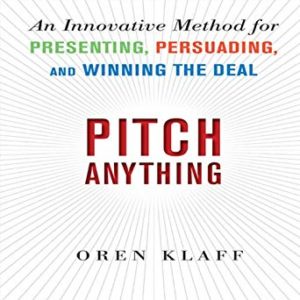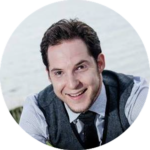


Long-term sales success and financial freedom are the goals every entrepreneur dreams of reaching. Our guest, Alex Schlinsky, is a serial entrepreneur running two six-figure companies. Armed with a psychology degree, he worked for the NFL and got MMA credentials as a media member. Alex is the Founder of the renowned mastermind and training program called Prospecting On Demand which was created to help entrepreneurs break free from the freelancer trap to achieve their goals and creating time and financial freedom without the common drawbacks and overwhelming hassle. Alex has had the opportunity to directly contribute to over 500 business consultants, generating $1,000 to $10,000 per month in monthly revenue while aiding over 120 entrepreneurs in the POD family and achieving their first six-figure year. Today, we take a closer look at what it really takes to achieve sales success and create financial freedom.
—
Listen to the podcast here:
[smart_track_player url=”https://www.podetize.com/statsapi/www.podetize.com/wp-content/uploads/fileuploads/11-5b145ef137b51b3d1af0633e9305c43d/11/2019/1d4b84cd6a26da0a02b7b63ba0df4564.mp3″ title=”Creating Sales Success And Financial Freedom With Alex Schlinsky” artist=”Nathan Hirsch” image=”https://freeup.net/wp-content/uploads/2019/04/OAS.png” ]
Download the audio file here.
Creating Sales Success And Financial Freedom With Alex Schlinsky
My guest is Alex Schlinsky. For those of you that don’t know, he got a psychology degree then worked for the NFL and got MMA credentials as a media member. He’s a serial entrepreneur running two six-figure companies. Alex is the Founder of the renowned mastermind and training program, Prospecting On Demand. It was created to help entrepreneurs break free from the freelancer trap to achieve their goals and creating time and financial freedom without the common drawbacks and overwhelming hassle. Alex has had the opportunity to directly contribute to over 500 business consultants, generating $1,000 to $10,000 per month in monthly revenue while aiding over 120 entrepreneurs in the POD family and achieving their first six-figure year. Alex, I’m excited to talk to you. We’re going to talk all about that. I know you’re all about sales so I’m excited to dive in. First, let’s take a gigantic step back. What were you like growing up? Were you a rebel? Were you a straight-A student? Did you always know you wanted to be an entrepreneur?
I definitely did not always know I wanted to be an entrepreneur. When I was a kid, I was the loudest person in the room consistently. I still am a loud person, very talkative. It was common for people in my community to pigeonhole me into, “He’s going to be an attorney.” That was the big thing as I was growing up. When I was fourteen to sixteen years old, I worked in the summer with a lot of attorneys to get wet in the area to see if that was something I wanted to do. Ultimately, that was not something I wanted to do. A great story I have is about someone who ended up becoming my first client a few years later in my agency. The first day I got into the car, he said, “Why are you doing this?” I said, “I want to become an attorney.” He said, “No, you don’t.” That was a unique experience. Growing up, I did not always want to be an entrepreneur. I wanted to do either a PhD or have a corporate job. I didn’t recognize what was at stake when you do that and the freedom that you have to replace for that. Once I went into school and recognize opportunities that I can do on my own, it was easier for me to dive in. Both my parents were entrepreneurs after doing corporate jobs. That made it an easier transition for me to feel comfortable to dive into being an entrepreneur.
Talk to me about your first entrepreneurial endeavor. How did that go? What did you do?
The first entrepreneurial endeavor I ever did was a garage sale at my house at six years old without telling my parents. I grabbed my old school Lego play box that was a table you could open up and had Legos in it. I took a bunch of stuff from my parents’ room. I wrote on a board, “Garage Sale.” I had some people buying some of my dad’s records. My dad was not happy about that when he drove back home and saw. That was definitely my first entrepreneurial endeavor. I might’ve been ten, maybe eleven.
In terms of my actual experience and diving into being an entrepreneur, it’s not exactly the standard entrepreneurial story, but it is unique and still fits in that mold in my opinion. When I worked for the Dolphins, I did not have any credentials. I did not go to school to become a journalist. I went to school to become a psychologist. When I left school and recognized that I wasn’t going to go to grad school to become a psychologist, I didn’t know what to do. I fell back to my old habits. I’m a huge sports fan so I called the Miami Dolphins every single day until they’d give me a job or opportunity. The first three months after I left school, I called the Dolphins every day and emailed every single website available to blog for the Miami Dolphins. I got an opportunity with a Sports Illustrated affiliate called FanSided. When I worked with them, I was able to land the opportunity with the Miami Dolphins. I did that all on my own through perseverance, productivity, and pushing for it. I would say that was my first successful entrepreneur endeavor, even though I had to work for someone else and it was a job. I put in that work myself and created the opportunity that I wanted to.
Always think to make the world better than it was.
I know you as a sales guy. I know a lot of people in the entrepreneurial community know you as the go-to for teaching sales. Where did sales come into play? You’re a high energy guy. Did you take a course on sales? Did you learn it through trial and error? Walk us through that.
I’ve never taken any courses in sales. The misconception with sales is that there has to be some way to persuade someone to pay you in a certain format. For me, sales have always been conversational. I first had my psychology class when I was a senior in high school. It was talking about introspection, the way the mind works, the amygdala, and how your hypothalamus works. I’m so fascinated by the human brain, human psychology, and the way that we think. I’ve had some experiences in my life that transformed who I was. Those meaningful thought-provoking experiences you have, especially going through puberty or growing up from 15 years old to 25 years old as a huge growth period in your time in your life. It transitioned me to think more about how human beings think, which made me more conversational, which led me to be open with people, which led me to allow them to pay me in certain ways.
What I ended up doing was taking all of the knowledge that I learned about psychology and then incorporating it into conversations. When I was starting, especially when I was working with attorneys and got so many people saying, “You’re obviously a salesman. You’re good at this. What have you done before?” I’m like, “I worked for the Dolphins. I haven’t done anything.” To bolster my skill, a real master has to hone their craft and practice. Bruce Lee once said, “It’s not about knowing 6,000 kicks. It’s the master is someone who practices that one kick 6,000 times.” One of my things was I needed to perfect and craft my skill. What I ended up doing was reading as many books as possible on it. My favorite probably ever would be Oren Klaff’s Pitch Anything. It’s an incredible book and well-written. I took most of my principles from that. That’s where I started to dive into my own principles and to start to learn my own formats and frameworks that I now coach and teach.
I want to talk about sales, but first I want to talk about your setup. You’ve got your agency. You’ve got the courses that you’re selling. How do you have it set up? Are you working remotely? Do you have an office talking to me about how your team is set up?
I have two companies. Prospecting On Demand is my coaching program and mentorship program. There are two pieces of Prospecting On Demand. One is my $1,000 standard Prospecting On Demand course for beginners and people that want to go on their own path and then a mentorship program that you work with our team and us. We take you towards $10,000 recurring and beyond for agencies, coaches and consultants. I have Sky Social Media, which is my marketing agency. The marketing agency is focused on personal jury attorneys. I’ve been doing that since 2011 or 2012. The way the structure of the marketing agency is my time is not devoted in any way to that company. I hired ReachLocal, which is a large marketing agency to handle all the fulfillment. I brought in clients and develop them an effective system that’s not just lead generation but a comprehensive marketing solution. We haven’t lost any clients in the last few years. We also don’t bring on clients because we charge a premium price for a premium level service, $2,500, $5,000 or $10,000 for our service packages.

The differences for people that are interested would be the $10,000 package includes a CRM, a $5,000 package includes SEO, and a $2,500 package is the standard. That’s the model. The way that the company is set up is that at ReachLocal we pay someone an extra investment in salary to make sure that they stick with us long-term. That worked out well for us. On the Prospecting On Demand side, my wife is also my business partner. We were carrying the load together for a few years as we started and then we started bringing on a lot of people. We did it mostly remote first with VAs. We then started working with people remote in the United States. A big shout out to John Davie, who was our first partner, and then we found Brian Downer, who was a coach in his own right and brought him into our fold. Now we have a team of six people, incredible coaches all in the United States, amazing human beings and intelligent. We all work in different areas. We’re going to have the entire team come out for the first time all meeting in person which is going to be amazing. I can’t wait for that. That’s the plan, the platform in the way that we structure our business.
You use FreeUp. You have one VA from us and you were like, “I don’t even know. I hate the responsibility of someone on my team to manage that VA and handle that VA.” I think a lot of people struggle with that. They’re not able to give someone else that responsibility. How are you able to do that and rely on them to manage other people on your team?
Micromanaging is something that I am totally not interested in. One of the most valuable things that I ever learned was a job scorecard. I learned this from Austin, a great guy, super smart business unit, an absolutely brilliant guy. I was having some trouble hiring because that’s one of the obstacles that I didn’t encounter and experience which was it was my wife and I. Now I’m hiring someone else. How do I make sure that they handle it? It’s like you’re talking about not even a VA, but someone at a higher level. How do I ensure that they handle what I need them to handle and feel comfortable letting them deal with it? One of the core competencies that Austin used to talk about was the ability to figure crap out. I love that core competency. That’s my model and mode.
If you can’t figure this out, don’t ask me the question. You’re not going to work with us later on and that’s okay. There’s nothing wrong with that. It’s fine. If I need to micromanage you, then there’s no reason for me to hire you. One of my big things is not having to be Superman. I don’t need to be Superman. I don’t need to be Atlas Shrugged. I don’t know and don’t need to carry the weight of the world on me. I need to focus on what I do best. Does that mean sometimes the people we bring on in the past haven’t worked out? Sure, that’s always going to happen. You’re not going to hit a home run with every person you bring on, but if you’re so honed in on micromanaging every single person you bring on, you’re not going to be able to do what you need to do. We put checks and balances in place of reporting, support, ensuring that certain things are there. At the end of the day, it comes down to trust and belief in the people you’ve hired and that’s exactly why. When you asked me at the beginning like, “What are you doing?” I don’t even know. Someone else on my team would handle that. That’s the management decided that I’m not dealing with because I’m focusing on other pieces.
How do you build a culture? How do you build a remote culture and not just a remote culture but a remote culture around sales? I feel sometimes people think of sales as cutthroat like me versus them. How do you bring it all together?
A confused mind does not buy.
It’s huge. Culture is everything to me. I am such a believer in this mission statement that we have, which is, “Our mission, our goals, and our purpose is much greater than the leader,” which is I. I don’t want this to be Alex Schlinsky’s plan. I want this to be the Prospecting On Demand plan. I want to impact a thousand people’s lives in helping them create a more efficient business process and system so that they don’t have to be a freelancer forever. They can be a CEO, they can have time and financial freedom the way that they define it and be able to provide for themselves, their families and the clients as well. I’m a strong believer that when you give from a place of integrity, you’re always going to get back from a place of integrity. In terms of the cutthroat style, I completely put that to the side.
I’m not anyone. I’m not of the belief that sales are cutthroat or in any way negative. I think it’s a critical aspect of human life and important to understand how to do it appropriately, fairly and with integrity. Ultimately, my biggest goal is to create the biggest impact possible. My dad, when I was younger, he used to tell me a lot about the Schlinsky name. One of the first mentors I hired asked me and told me I should maybe switch my last name. I’ll tell you why I hired that guy that day because of what my dad used to say. He used to say the Schlinsky name needs to mean something. The name is unique. It doesn’t mean that Johnson’s or Brad’s are standard last names and don’t mean anything, but what he was expressing as your uniqueness is what allows you to stand out and make the biggest impact possible.
Make the world better than it was when you got here. That’s something that I take to heart. That matters to me. That’s why we created this culture, not around the Schlinsky name, but around what our mission is. It is to impact as many people’s lives as possible and that’s why when people work with us, they flock to us because of that culture, because of the Prospecting On Demand family, because they know we give a crap rather than, “Can I take your money and squeeze out from whatever I need from you?” That’s my style. That’s our model. In building the culture, the number one thing that I’ve learned, the value that I’ve brought to the table is allowing everyone to have a seat at the table and speak their mind. One of the biggest and most valuable things I’ve ever done are calls and meetings with my team where I don’t say anything, which is hard for me. I wouldn’t say anything and I want to hear what they have to say without the fear of them getting fired or bludgeoned to death. If they say something that doesn’t fit in my mold, I want to hear their voice. I want to know what that means and that’s how we create a culture. That’s how it works effectively for us.
You’re obviously someone that’s invested a lot in themselves. You talked about hiring coaches and mentors. I think sometimes that scares people off. There are so many people out there that are marketers. How do you know who’s legit? Who should you follow? How do you figure that out? How do you decide when to invest yourself? How do you decide what that correct investment is and who to go to?
There’s no right or wrong answer. I definitely made poor investments. I can’t sit here and say that I’ve made every investment worked out exactly the way I want to. One of the key pieces of my life is understanding the energy balance of human beings. I don’t mean this in a metaphoric sense or like even the stars are aligned. You can believe whatever you want and that’s all fine. Naturally, a human being is similar to the gas tank in your car. At some point you’re going to deflate yourself. You’re going to be low on energy and you have to identify what brings you energy. A lot of people, what brings them energy is working out. Nathan, I know you’re big on that. That brings you energy.

A lot of people want to spend time with their kids or their wife that brings energy. A lot of people want to listen to music or go go-karting that brings energy. What brings me energy is my alone time, me being in my own zone. It’s getting away from all the noise. That’s important to me to take time to slow down and slowing down is when I’m capable of figuring out when to make the appropriate investments. I think a lot of people make investments while they’re metaphorically running and that causes them to make poor missteps. I like to slow it down before I start running to get to the core root issue and identify who can help me. When someone tells me they’ve made an investment that didn’t work out for them, I always try to explain what I want to understand is your core root issue and whether or not I fit that mold.
If I do, I’m going to be aggressive in getting you in here because I know that it would be a disservice for you if I didn’t. On the other hand, if it’s not the right fit for you, I’m not going to waste your energy or time. I’m never going to allow someone to get in a conversation with someone else that’s like me and say, “I went with Alex Schlinsky in Prospecting On Demand and it sucked and it didn’t work.” I won’t let that happen to the best of our ability. We build a lot of goodwill with the people we work with because of the energy and style that we put in. That’s a major focus. When I’m trying to identify the best investments possible, I slow it all down, identify what’s the core issue or problem here that I’m facing and then identify how I can solve that. Whether it’s with something that we already have or some other investment I need to make outside of that.
I love slowing it down. I love building that culture. I love how you have two different businesses. One, your agency where you have a white label partner and the other one where you have a team, you’ve got virtual assistants and people all over. Whether it’s coaches, contractors or whatever it is. It’s two different ways to grow a business. Let’s switch gears for a little bit. I want to talk about sales. Where is it the average daily entrepreneur messes up when it comes to sales?
It’s probably sticker shock. I would say that’s probably the singular, core issue. Sticker shock is allowing someone to focus on a price instead of isolating that variable. I’m big on isolating the price variable. Get everything else off the table, no other objections on the table other than what’s the price of this service? That’s where everyone’s mind is at the start of any sales conversation. What’s the price? Isolate that variable so we can avoid sticker shock. In a much larger sense, I think there are two other key pieces. Number one, everyone offers the same thing where it’s fighting for the bottom of the barrel like, “There’s so much competition so I’ll charge lower.” They then rant about how the clients suck. It’s like, “Yeah, because you’re offering them a low-price crap service.”
You get what you pay for. That’s part of the game. On the other end are frames. People do not understand frameworks at all in any way. They do every single sales call in a completely different way. They can’t learn from anything and it’s not homogenous, essentially the same thing over and over so that you can optimize it. I think that’s where people lose it. One of the things that I do is teach them a powerful psychological technique called the PAC model. This is a 1950s psychoanalytic theory from a Canadian psychologist, Eric Berne. Most people, when you say psychoanalysis, they’ve probably heard of Sigmund Freud and all that stuff but you don’t hear about these other people that have made these unbelievable transformational, incredible discoveries of how the human psyche works.
Caring is definitely the best way to express sales intent.
PAC is definitely my favorite in terms of sales. The PAC model and limited process here is Parent, Adult, and Child. These are the three ego states that you speak to in every single conversation. The Parent is the person that is naturally skeptical because they want to do it out of security for themselves, their family or their investments and their time. How do you overcome skepticism? You need to have proof of some cases to show them that you can overcome that skepticism. The Adult process is a logical framework. Most people hopefully think analogical framework so what you need to do is have a one, two equals three process. That’s the idea rather than all this stuff. Remember this sentence, “A confused mind does not buy.”
C is the Child. This one is the easiest one for people to resonate with. It would be that childlike dream and goal that you had if you were moved to all the other things and responsibilities in your life. What’s left at the courts? That childlike goal that you want, the sipping of margarita on the beach. It’s the opportunity to be free on the Titanic and feeling the wind. Those are the models that you need to be discussing in your sales and overcoming those processes. If you want to follow me and learn what I do, when you read any posts that I do. When you listen to any podcasts that I do, when you watch any training that I do and when you read any content that I post, identify that I’m always speaking either the P, A or C or all three at the same time. That is how persuasion happens in a fair way with integrity, allowing someone to make an investment that makes sense for them. That’s called transactional analysis and that’s how I’ve taken my psychology background and utilized it for sales in an effective way.
How would you describe yourself as a salesperson?
I’m caring. I think that’s the best way to say caring. I do care. Sometimes a little too much like totally frankly. I can end the day thinking about the person I spoke to that day because they are in a tough scenario. I’ve been in tough scenarios before and I’m grateful for where we’re at in the work that we put in. Sometimes, it’s difficult for me to have the appropriate perspective and perspective is everything in life. When I go into a sales conversation, what I sincerely want to do is have the person’s best interest at heart.
My best interest is always making money. That’s the obvious best interest. What I want to transition is this mindset that the only way to have a successful sales conversation is to get paid. I don’t believe that. What I believe is that time is worthwhile. That if you made any impact whatsoever, then it matters. I get on calls with people and they tell me how difficult their life is at this moment and how hard things are. I understand that all they’re trying to do is say, “Alex, do you have what I need to make this solution? If so, tell me honestly with integrity or don’t.” Sometimes I have to get into a conversation and bite the bullet and say, “It sucks to say this. I’m not the person to help you right now.” Ultimately, it’s not my best interest to say that to you, but it is your best interest and that’s what you need. When I’m on a sales conversation and when I’m going to make an investment, all I want is on the other end the person to say, “This is what you need in confidence, not just so I can make money, but because this is what you’re missing.” I think caring is definitely the best way to express my sales intent.

I had the same mentality. The example that I always give is if someone comes to me and they say, “I don’t know anything about eCommerce. I want to build a Shopify store that makes me $10,000 a month. I want to hire a VA from you for $5 an hour and have them build it.” I was like, “We’re not your place. You need to go take a course. You need to go talk to a mentor. I’m not your guy.” I love it as opposed to the used car salesman where as long as they’re pushing cars and getting them off the lot, it’s a sale a success.
I’m not like that. It’s hard for me to have this mindset of by any means necessary sell and then you’re putting them in a worse position. I want to be in their shoes. I want to understand what it’s like, what’s at stake. I understand what’s at stake. There’s too much at stake to not care for the person on the other end. That does make sales more difficult in terms of the ultimate goal, which is getting paid. If you transition that goal from being paid to making an impact and making a difference in someone’s life, then I think you’ll find a lot more rewarding process through sales. That’s why I still do them. Nathan, people get on calls with me and they’re like, “Is this Alex? Wait, what? Why are you doing the call? Why didn’t you hire someone?” I’m like, “I love doing this. I’m super passionate about it. I want to be connected to you. I want to learn about you and I want to see if I believe in what I can provide to you because that’s important to me.” It doesn’t mean that forever I can make sales. At some point, we’re going to have to bring someone else on, but I’m going to do it until I can’t. That’s important to me.
Alex, where can people find out more about you? What are you most excited about?
The best way to find me is on ProspectingOnDemand.com or go to my Facebook, Facebook.com/schlinsky. I post all my content there and on my website as well. I do training all the time and I have a free group as well called High Ticket Sales & Systems for Entrepreneurs. It’s good so if you want to join that on Facebook, feel free to. The thing I’m most excited about, my whole team is coming down to Tampa, Florida and we’re doing some video shoots, some high-quality stuff. I think the only thing that I feel I’ve missed that has been a dissonance through my career is that I don’t have the right quality of video production to showcase the quality of service we provide. I made a hefty investment in that time and financially and I’m excited to see the result, to have our whole team here and express that culture that we have. I can’t wait. Honestly, I’m excited.
I’m excited to see that content. Check out Alex and his Facebook group. Thanks for coming on.
Thanks, Nathan. I appreciate it.
Important Links:
- Prospecting On Demand
- Pitch Anything
- Sky Social Media
- ReachLocal
- ProspectingOnDemand.com
- Facebook.com/schlinsky – Alex’s Facebook account
- High Ticket Sales and Systems for Entrepreneurs – Facebook group
About Alex Schlinsky
 Alex Schlinsky From a Psychology degree, to NFL and MMA credentialed media member, to serial entrepreneur running two 6-figure companies.
Alex Schlinsky From a Psychology degree, to NFL and MMA credentialed media member, to serial entrepreneur running two 6-figure companies.
Alex is the founder of the renowned mastermind and training program, Prospecting On Demand, created to help entrepreneurs break free from the “Freelancer Trap” to achieve their goals of creating time and financial freedom, without the common drawbacks and overwhelming hassle.
Alex has had the opportunity to directly contribute to over 500 business consultants generating $1,000-$10,000+ in monthly revenue, while aiding over 120 entrepreneurs in the POD™ family in achieving their first 6-figure year.
